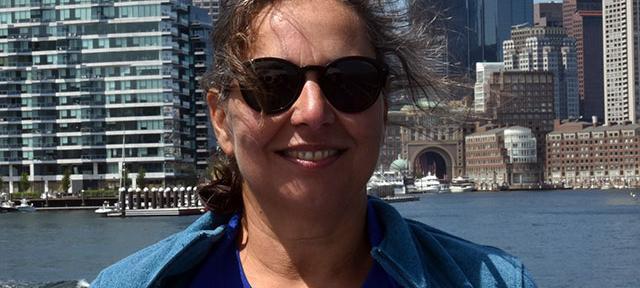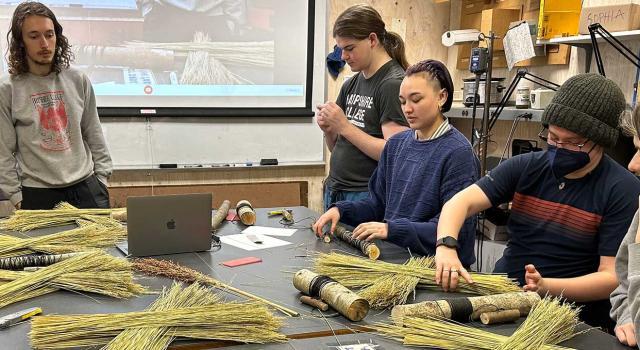Hampshire Professor Laela Sayigh on the Life-Changing Value of Hands-On Research

"At Hampshire, I can teach my courses around what interests and excites students, and this can even evolve throughout a class."
A student’s educational experience at Hampshire College is unlike anywhere else — and unlike anyone else’s. We sat down (virtually) with Assistant Professor of Animal Behavior Laela Sayigh to learn a little about dolphin bioacoustics, how freeing it is not to teach to exams, and what she finds so compelling about the Hampshire experience.
Do you have a favorite class that you teach?
It’s hard to choose a favorite! A January field course that I co-taught with animal behavior professor Sarah Partan called Behavior of Marine and Terrestrial Wildlife of Chilean Patagonia was successful beyond my wildest dreams. We went to a remote location in Chile and spent a lot of time on a boat out in the middle of nowhere. It was a life-changing experience for me as well as for the students. But in terms of my classroom-based classes, I would probably choose Cetacean Communication and Bioacoustic Analysis. This was a true hands-on class where students analyzed real bioacoustic datasets from whales and dolphins to answer biological questions. Several students in this class ended up continuing their work as Division III or independent study projects. It was really fun to see the students get excited about doing research!
What does being a faculty member at Hampshire allow you to do that you couldn't do elsewhere?
It is incredibly liberating to not have to focus the curriculum on exams. I previously taught at a more traditional university and was frequently asked by students if they "needed" to know something because it would be on an exam. At Hampshire, I can teach my courses around what interests and excites students, and this can even evolve throughout a class. This aspect of teaching at Hampshire really thrills me! I think it encourages students (and me) to explore and push limits in ways that are not possible in more traditional learning environments. I am also blown away by my amazing colleagues, and I love how open they are to exploring collaborative teaching possibilities that again push beyond traditional learning paradigms.
Have you held any other professions before or during your time at Hampshire? And if so, have they informed your work at Hampshire?
Yes! I am in a half-time position at Hampshire, and the rest of my time is spent at the Woods Hole Oceanographic Institution (WHOI), in Woods Hole, MA. WHOI is a research institution where I am surrounded by cutting-edge science. This arrangement is, to my mind, the best of both worlds; I can bring aspects of each institution to the other, hopefully to the benefit of both. For example, one of my Hampshire Division III students carried out an internship with me at WHOI last summer through the Five College Coastal and Marine Sciences certificate program.
Have you worked on collaborative projects with students?
Yes! The same student I mentioned above, Molly Dent, is working with me on a project that I have been involved with for almost 7 years, which is focused on trying to develop an alert system for dolphin mass strandings. She got interested in this project through her work in my Cetacean Communication and Bioacoustic Analysis class and decided to continue working on it for her Division III project. I also have an ongoing project studying vocal mimicry in beluga whales at Mystic Aquarium that I am working on with Division III student Aurora Pearson.
Hampshire is a place known for its #Changemakers. What do you think is so special about this place?
Hampshire really gives students the space and opportunity to follow their passion. Although this is certainly possible at other schools too, I don’t know of others that actually devote the entire senior year to a self-designed project. I think the statistics speak for themselves; a large percentage of Hampshire grads go on to graduate or professional schools where they can continue to hone in on their passions!
What do you like best about teaching Hampshire students?
I like that they have curiosity and drive to learn and explore new ideas; I think this is what draws students to Hampshire.



